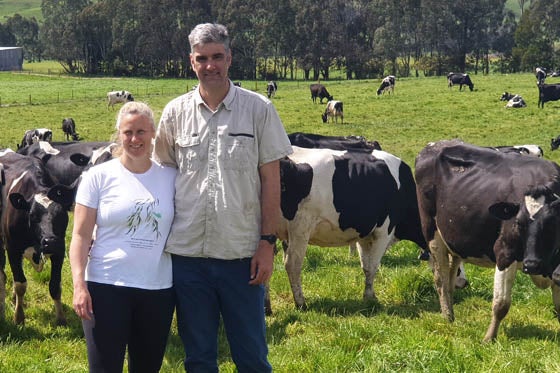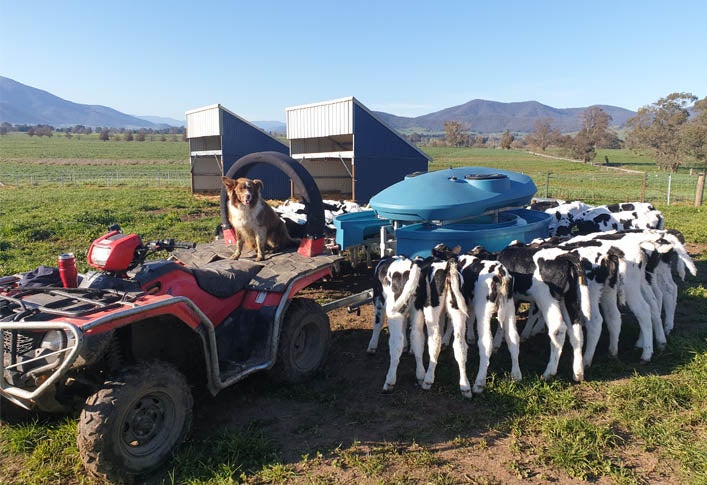Posted by on
24/05/2021
While dairy farmer Scott McKillop considers the health and welfare of his dairy herd paramount, he’s equally conscious of a less-discussed sustainability goal – the well-being of the people working within the industry.
Recent capital works across his 400 head dairy, based in north east Victoria’s Dederang district, were instigated with both animals, and staff, front-of-mind to help establish greater efficiencies on all fronts.
A newly installed automated dairy teat spray, delivered via a robotic wand, has already proven its worth, helping re-shape the traditional dairy farming workload.
“Our aim is to create flexibility in the use of labour, and this innovation can take the pressure off someone having to manually spray teats, which is monotonous and time consuming,” Scott said. “This labour can now be deployed to higher value tasks such as feeding calves – or even better, playing cricket and enjoying some well-deserved time off.”
Much of Scott’s time in the business is now dedicated to management rather than labour, reflective of the growing complexity, and compliance needs, within a modern dairy.
As such, he said on-farm investments were geared towards eliminating the need for mundane, repetitive tasks that physically strain staff.
“We want to look after our animals, and our people, and encourage a lifestyle balance – particularly considering the effort that goes into a working dairy.”
A ‘milk taxi’ is another recent addition, a stainless steel 270 litre self-driven machine that mixes, warms and dispenses milk through a hand piece, meaning no more manually lifting heavy buckets.
Calves on the McKillop’s farm now have a schmick new shed, with concrete floor and plastic walls – again for both hygiene and ease of cleaning for staff. The bar heaters also provide relief for newborn calves born in wet spring conditions.
The McKillop family was one of the first to settle in the region in the 1850s, and over the past 40 years the family has gradually aggregated neighbouring beef and dairy operations into a consolidated beef operation.
However, the allure of the camaraderie within the dairy industry, coupled with its progressive nature, prompted Scott to convert the beef operation to dairy when he returned home to the farm in 2009.
“We had sharefarmers running the dairy for a few years, and when the contract finished up I decided we really should be doing it ourselves.”
“I was impressed by the people within the industry – their willingness to co-operate rather than compete, and openness to help each other out,” Scott said. “It’s an industry that’s pro-active, responsible and profitable which are great cornerstones for business.”
While his father had milked cows in his youth, dairying was new to Scott. Yet having enjoyed a successful career in the stockfeed and agronomy industry prior to farming, he said the immediacy of dairy was appealing.
“Our actions today yield results tomorrow – to have that level of control over the quality of input and output is really exciting, and aligned with my skillset. We strive to ensure our herd’s nutrition is optimal, so we can produce a premier dairy product.”
Cow collars were another recent innovation adopted on farm, designed to ensure cow health through meaningful, real time data.
“From these collars we can measure ruminant digestive system activity and cow activity to gain an overall snapshot of cow health,” Scott explained. “Data is collected every ten minutes, allowing us to identify immediately whether a cow is inactive and possibly unwell or if it’s in heat, and it’s reassuring knowing we can pick up issues such as mastitis early, and start treatment immediately.”
Scott, together with wife Belinda and three children, Angus, 14, Lexi, 12, and Marli, 10, operate over 500 hectares total, milking 400 cows over 220 hectares, with the remainder dedicated to running replacement heifers and beef production.
“We run approximately 650 to 700 young stock, and some opportunistic Angus Friesian Cross steers, which we grow out to two years old, of which we have about 70 at the moment.”

Perennial and annual grasses, predominantly ryegrass, is grown, along with forage sorghum over summer when the season allows, and further opportunistic pastures are planted to help spread feed across the full growing year.
Forage conservation is also a key priority for Scott, with silage stored over spring to ensure there is always enough feed to compensate during those months when green grass is lacking.
While the farm has a small water allocation from a local creek, irrigation is not currently viable over the summer months, with flows too slow. However Scott said the opportunity to create a dam to capture water over the winter months was currently a work in progress.
Exporting heifers to the Chinese market was another important income stream for the McKillops, with milkers bred using sexed semen, and heifers tested on their genetic merit before export at six to seven months old.
It’s an involved process, but worthwhile for its premium returns, Scott said.
“Recently we sold A1 bred Friesian heifers, 180 kilograms or above, for $2,100, and generally we export about eighty and keep the other half, so it’s a premium worth pursuing.”
And now, after 12 years in the industry and throughout the ongoing evolution of his own business, Scott has come to encapsulate the collaborative dairy farming culture he so admired.
He is currently a director of Mountain Milk Co-Operative, which consists of a group of farmers working together to fill the gap in the wake of Murray Goulburn’s demise.
“We kicked off in 2018, and the founding members all live within ten kilometres of each other, so it’s a genuinely local co-operative, with the region’s best interests at heart.”
“When it looked like Murray Goulburn was going to fall over, we had two choices – sit back and take what we could get, and whinge about it, or have a go ourselves.”
With the north east region underrepresented in terms of milk processors, company options were limited, with the farmer co-operative a natural fit.
And with a three year milk supply agreement and set price, the model gives local farmers the ability to plan and invest “in the farm, in people, or off-farm – it affords enormous vision”.
“This co-operative also seriously considers its responsibility in managing the region’s soils, natural environment and rivers, and all directors have a strong love for the local land, and want to leave it in the best possible condition for the next generation of farmers.”
He said some of the greatest inroads made during his time in the industry were the increased number of local players from across the regions and greater options surrounding to whom product could be sold.
Continually and proactively upskilling – with a generous willingness to share newfound knowledge – is further testament to Scott’s industry commitment, and indicative of the solidarity amongst dairy producers.
“We need to be proactive as an industry, it will be a far better outcome if we can take a lead on environmental and welfare issues through a highly considered and researched approach, rather than it being thrust upon us by government.”
As a Rabobank client, Scott said access to expert analysts such as Blake Holgate and Michael Harvey was an extremely valuable resource for farmers on the ground, helping build networks and identify how other farmers across Australia and New Zealand manage for sustainability and profitability.
“Rabobank is by far number one in terms of its knowledge sharing platform, and I’ve gained really meaningful insights through initiatives and events such as Farm2Fork.
“Personally and for Mountain Milk, these opportunities have taught me so much about sustainability, and opened my eyes to so many new opportunities.”
This is the McKillop’s third year with Rabobank, and Scott said he was impressed by his manager, Murray Wallace’s genuine interest in his operation, and success.
“Rabobank wants to be on the journey with you, it’s is not just a financial service provider if you want a new tractor or a loan – Rabobank makes it a priority to be across all the workings of the operation to improve your business and wealth,” he said.
“Rabo sees a much larger vision, and is far more proactive than we’ve been used to from traditional banks.”
And with rural manager, Murray a proud local Scott said it was encouraging to deal with professionals invested in the community.
“I’ve known Murray for some time, we did a community leadership program a few years ago and I know that he loves farming, loves our community and is invested in our journey – and he’s not afraid to challenge and question us to get the best out of our business.”
Curious for opinions and advice, Scott was mindful to surround himself with good people.
“I don’t know everything, so I’m always looking to find people and build relationships – be it with the bank, agronomists, a genetics team.”
“As a young farmer the way I learnt was from asking older farmers, and really listening to their learnings at our local discussion groups, and now that I’m middle-aged, it’s heartening that some of the young ones now ring me.”
And that, he said, was reflective of the healthy and vibrant culture of being a dairy farmer, “we’re always learning, and always passing on information from one generation to the next.”
